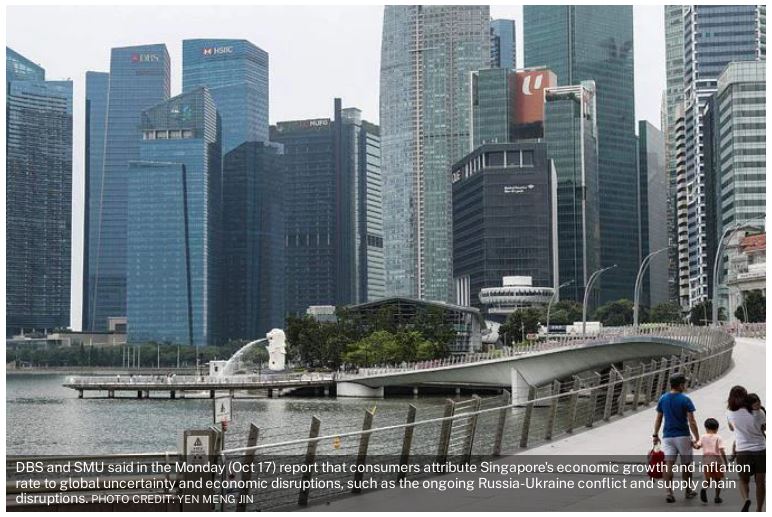Singapore’s inflation expectations at 11-year high amid global economic uncertainty: poll
SINGAPOREANS’ headline inflation expectations for the year ahead hit an 11-year high, up to 4.6 per cent in a September poll from 3.9 per cent in June 2022, according to the latest quarterly results of the Singapore Index of Inflation Expectations (SInDex).
The September figure is the highest recorded since December 2011, which also polled at 4.6 per cent.
In comparison, the historical third quarter average was about 3.2 per cent from 2012 to 2021, while data from the Monetary Authority of Singapore (MAS) forecasted a median of 3.5 per cent for consumer price index (CPI) all-items inflation in 2023.
The latest CPI data from the Department of Statistics also showed a 5.7 per cent year-on-year increase for CPI all-items in January to August, with the latest August monthly inflation print coming in at 7.5 per cent year-on-year.
The SInDex report, published Monday (Oct 17) jointly by DBS and the Singapore Management University (SMU), is derived from an online survey of 500 randomly selected individuals that represent a cross section of Singaporean households.
In a joint statement, DBS and SMU said consumers believe that even with policies in place to ease the impact of the pandemic and its aftermath, global uncertainty and economic disruptions will negatively affect Singapore’s economic growth and inflation.
For instance, 29.7 per cent of consumers believe a general increase in prices is due to the ongoing Russia-Ukraine conflict, while around 23 per cent attributed it to supply chain disruptions and the easing of Covid-19 restrictions each, respectively.
“At the same time, MAS is compelled to continue tightening monetary policy,” said DBS chief economist and managing director of group research Taimur Baig. The central bank had tightened its monetary policy for the fifth time in 12 months on Friday, as part of efforts to slow the momentum of inflation and ensure medium-term price stability.
“Such tightening may be uncomfortable for many, but the regressive impact of high inflation is far more pernicious,” said Baig.
SMU’s assistant professor of finance and the report’s founding principal investigator, Aurobindo Ghosh, added that the International Monetary Fund recently projected a slowdown in global growth in 2023, at 2.7 per cent – their weakest forecast since 2001, barring global crises such as the Global Financial Crisis and the peak of the Covid-19 pandemic.
“(Our) findings seem to be tracking the global outlook of uncertainty, where Singaporeans expect a slightly negative impact on growth while overall inflation expectations heightened,” he said.
The overall inflation expectations for the year ahead, after adjusting for potential component-wise behavioural biases and re-combining across components, inched up by 5.7 per cent in September, from 5.5 per cent in June.
Meanwhile, inflation expectations of all individual components remained unchanged at 5 per cent, except the inflation expectations for food, which increased to 6 per cent from 5 per cent, and that of transportation, which remained unchanged at 8 per cent.
Excluding the more volatile components of accommodation, private transport costs, as well as food and energy-related expenses, core inflation expectations for the year ahead grew to 4.5 per cent in September, from 4.0 per cent in June. This is in contrast to the average of 3.1 per cent since the survey’s inception in 2012 till 2021.
Core inflation expectations for the year ahead also rose to 4.6 per cent for a subgroup of the population who own their accommodation and use public transport, from 3.8 per cent in June.
Ghosh noted that these component-based inflation expectations showed continued and persistently high values for food, transportation, housing and utilities.
“As households expect prices to continue rising, they are allocating an increasing share of their budget to spending on these components,” he said.
The research team highlighted that inflation expectations in the longer term increased at a more moderate pace.
Overall inflation expectations for the next five years, for example, increased slightly to 4.7 per cent in September, from 4.5 per cent in June. This is higher than the third quarter average of 3.9 per cent since the survey’s inception in 2012 till 2021.
Inflation expectations excluding accommodation and private transportation costs bumped up to 4.7 per cent this quarter from 4.3 per cent last quarter, while overall composite inflation expectations hiked to 4.7 per cent from 4.4 per cent. In comparison, the third quarter average value of composite inflation expectations since the survey’s inception in 2021 till 2021 is 3.8 per cent.
This raises hope of more anchored or grounded inflation expectations in the future, said Ghosh.
He added that there is more stability in the livelihood over life debate – measure of the trade-off between prioritising economic growth compared to the cost of life – with four people prioritising livelihood over life for every person who prioritised life over livelihood.
In addition, the September survey found around 10 per cent of Singaporeans expect a more than 5 per cent reduction in salary in the next year, down from 11.5 per cent in June. The median salary increment expectations held firm between 1 per cent and 5 per cent.
“This is signalling that we have approached a new normal of endemic Covid-19,” said Ghosh, “and most advanced economies, including Singapore, are on a similar path to pursue non-inflationary growth despite challenging global macroeconomic conditions.”
Source: https://www.businesstimes.com.sg/government-economy/singapores-inflation-expectations-at-11-year-high-amid-global-economic


 English
English




